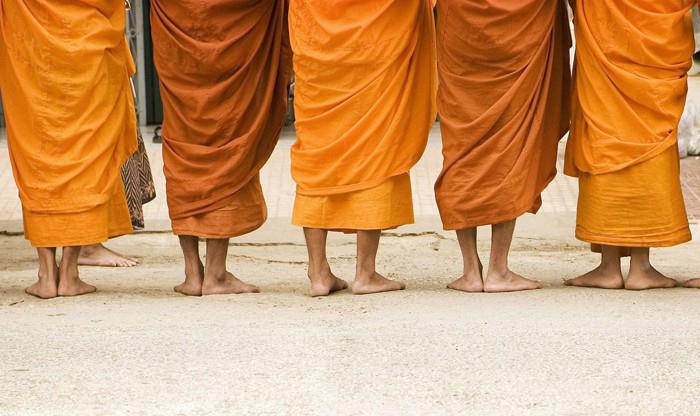[image title=”” size=”full” id=”6636″ align=”none” linkto=”none”]
Abandon anger,
Be done with conceit,
Get beyond every fetter.
When for name & form
You have no attachment
— have nothing at all —
No sufferings, no stresses, invade.
-Kodhavagga; Dhammapada-
The development of effective measures to prevent deadly conflict begins with the articulation of the problems generating the conflict, and it requires the mobilization of social forces desirous of addressing those problems (Appleby 2000). Buddhism in this context has been exceptionally active in its efforts to combat systematic violence, prejudice and hatred through non- violent means of conflict resolution. Since resolving conflict is essentially a practical exercise this article would present relevant aspects of Dhamma in reference to situations in which Lord Buddha personally intervened to resolve conflicts before they erupted into hostilities.
Conflict resolution methods from a Buddhist perspective would show a way forward regarding how Buddhism can be used in the contemporary context of Sri Lanka as an instrument and an empowering movement for strengthening co-existence among communities in a post-war setting. Sri Lanka as a nation recovering from a prolonged civil war has its long term commitment to strive towards regaining integrity and sustainable peace among all ethnic groups. Hence, there exists a timely need for the formulation of constructive post-war peacebuilding initiatives based on the teachings of Theravada Buddhism which respects the notion of humanity undermining all forms of discrimination on race, class, ethnicity, ritual duties or ideologies. At this point, for future conflict prevention it is extremely necessary to emphasize that Buddhism does not permit violence and war under any circumstances and there is nothing that can be called a “just war” according to Buddhism – which is only a false term used to justify and excuse hatred, cruelty, violence and massacre. As C. G. Weeramantry an eminent jurist and the former Vice President of the International court of Justice put it in his opinion in the Legality of the Threat or Use of Nuclear Weapons case;
‘The Buddhist tradition… would not countenance the taking of life, the infliction of pain, the taking of captives, or the appropriation of another’s property or territory in any circumstances whatsoever. Since it outlaws war altogether it could under no circumstances lend its sanctions to weapons of destruction-least of all to a weapon such as the nuclear bomb.’ (Weeramantry 1996).
However, one may still be ambiguous to know whether there is a possibility to legitimize wars of self-defence to uphold righteousness after all peaceful methods have been exhausted. Answer still remains ‘no’, as numerous passages in the Buddhist scriptures advocate a totally peaceful response to violence both by individuals and by states. For example, with regard to individuals, the Samyutta Nikaya (iv) Punna Sutta, reports the following dialogue between the Buddha and a disciple who is about to enter hostile territory:
‘But, O Punna, the men of that country are violent, cruel and savage. When they become angry at you and do you harm, what will you think then?
‘I shall think them truly good and kind folk, for whilst they speak angry and insolent words, they refrain from striking or stoning me.’
‘They are very violent folk, Punna. What if they strike or stone you?’
‘I shall think them kind and good not to smite me with staff and sword.’
‘And what if they kill you?’
‘I shall think them kind and good indeed who free me from this vile body with so little pain.’
‘Well said, Punna, Well said! With you great gift of patience, you may indeed essay this task. Go Punna yourself saved, save others.’ (Samyutta Nikaya (iv) Punna Sutta, cited in Saunders, Gotama Buddha: A Biography based on the Canonical Books of the Theravadin)
In relation to peaceful dispute resolution Buddhist teaching explores every possibility to resolve disputes without resort to violence. For instance on two occasions the Buddha intervened and prevented Sakyas and Koliyas from fighting over the waters of River Rohini. The commentaries of the Anguttara Nikaya and the Samyutta Nikaya recount this instance. As a result of the Buddha’s peaceful mediation and the dispute resolution according to Dhamma, made a large number of young persons of the Sakya clan entering the Bhikku Sasana. Similarly, in many regions of the world today mainly in Africa and Asia the incidence of civil war over scarce natural resources has become an inclining trend. Thus, among the many methods available reconciliation, mediation, arbitration and negotiation should be wisely adopted to bring these conflict to a peaceful end. Another successful intervention by the Buddha resolving dispute took place in Sri Lanka at Nagadipa, where he persuaded two warring princes in Sri Lanka to lay down their arms and amicably settle their dispute over a gem-set throne (Weeramantry: 2007).
In certain occasions Buddha points out to the confronting parties the losses they would sustain by indulging in battle. Lord Buddha even stated that the victory is hollow and every victory contains within it the seeds of another conflict. This statement could be further illustrated using the story of the defeat of the King Kosala in Dhammapada Verse 201, Kosalaranno Parajaya Vatthu. In fighting against Ajatasattu, the King of Kosala was defeated three times and the King of Kosala was ashamed and very much depressed over his defeat. The news about the king’s distress spread like wild fire and when the Buddha came to know about it, he said,
Jayam veram pasavati
dukkham seti parajito
upasanto sukham seti
hitva jayaparajayam.
“Conquest begets enmity; the conquered live in misery; the peaceful live happily having renounced conquest and defeat”. (Dhammapada Verse 201, Kosalaranno Parajaya Vatthu)
Since non-violence is embedded in the heart of Buddhist thinking it will forbid killing even if one’s own life is at risk of dying. The Kamcupamasutta (Majjhima-Nikkaya I-28-29) clearly demonstrates the need to love your enemy no matter how cruelly he treats you; “Even if thieves carve you limb from limb with a double-handed saw, if you make your mind hostile you are not following my teaching”
Moreover, in Maha Nidhana Sutta (digha nikaya) Buddha clearly states how the thoughts of greed and possession lead to the creation of acts of aggression;
“Ananda, I have said that because of watchful guarding (of possessions) there arise many wicked demeritorious acts, such as hitting with sticks, wounding with weapons, fighting, quarrelling, contentiously disputing, using unbearable expressions, backbiting and telling lies …”
Buddhist scripture quoted above proves that Buddhism being an essentially a peaceful tradition leaves no room for the use of violence under any circumstances. The world needs Buddhist ethics in the struggle to create peace, and not only among human beings, but also with nature (Galtung 1993). Hence Buddhism has so much to contribute when intervening in real world issues relevant for peace and it only wields one sword, the sword of wisdom, and recognizes only one enemy – ignorance.
“May you realize the Four Noble Truths in this Blessed One’s era itself….”
Dilini Withanage











Recent Comments